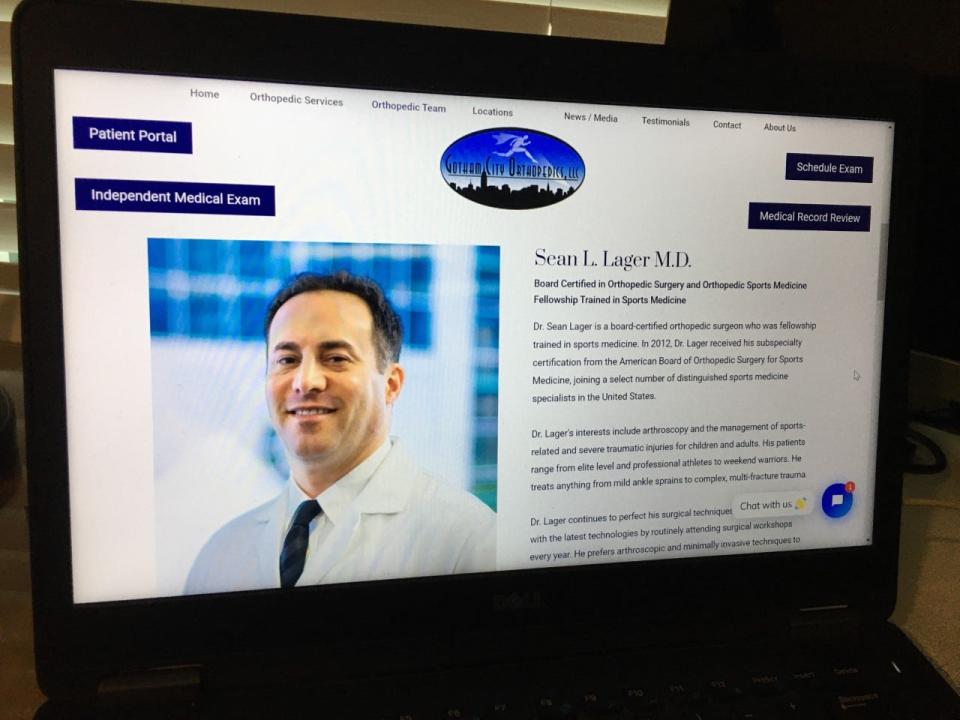7 takeaways from our investigation of Tennessee's workers' compensation system
The Commercial Appeal spent months speaking with injured workers and reviewing hundreds of documents related to workers' compensation cases in Tennessee.
Here are the seven takeaways from our investigation of the system.
If you're hurt on the job, companies that represent your employer can block your treatment

If you are hurt on the job in Tennessee, the company you work for will likely coordinate with an insurance company or a third-party claims administrator to handle your treatment.
Those companies represent your employer and they have a financial incentive to reduce costs. The companies can block your medicine, your physical therapy, or even your surgery, overruling the judgment of the doctor who's treating you.
The companies that represent your employer can block treatment through a process called utilization review. The company sends your medical records to another doctor, often in another state.
Injured at work? Top tips for navigating Tennessee's workers' comp system
The company is paying the other doctor. That doctor, who has never seen you, has power to block your treatment as medically unnecessary.
Workers who are denied medical treatment can spend months — or years — in pain as they appeal their cases and fight the system.
When workers' compensation companies hurt people, the state gives them tiny fines
Tennessee has created rules to protect workers from unjust denials of medical care. The state has power to penalize companies that break those rules.
But the state government does little to stop abuses, the investigation by The Commercial Appeal found.
The Commercial Appeal used public records requests to obtain documents on 123 state penalty cases involving individual injured workers from early 2017 to early 2022. The offenses ranged from minor paperwork violations to lengthy denials of necessary care that threatened people's recovery.
Big hurt, tiny fines: When workers' comp firms harm people, Tennessee does little to help
Tennessee's government issued no-fine warnings in 57 of those cases — by far the most common result — followed by fines of $250 in 20 cases.
For example, an insurance company stalled surgery for months to a woman in the Chattanooga area, Doratha Ellis.
The state fined the insurance company only $250 for mishandling the case — and never told the injured worker.
Reached for an interview, Ellis said she has never received the surgery.
State officials: Heavy fines would draw protests from legislators and businesses
Tennessee's Bureau of Workers' Compensation rarely pursues heavy penalties against these companies, said Troy Haley, the bureau's director of legal services and legislative liaison.
"The amounts are generally on the low end, unless you've got a repeat offender. And we've had a couple of those where we've had to do more than that.”
“But we're mainly trying to generate compliance," he said. "If we are too heavy-handed in our penalties that certainly, you know, gets the attention of business stakeholders and legislators."
The most-fined company? A Memphis workers' comp giant called Sedgwick
Sedgwick Claims Management Services is the largest third party workers' comp administrator in the United States. It has recently handled Tennessee workers' comp claims for blue-chip companies including FedEx, American Airlines, General Motors, Kroger, Office Depot, International Paper, Lowe’s, Macy’s, Sears and others, according to records.

Tennessee fined Sedgwick for mishandling a surgery request for a Memphis truck driver named Peter Montgomery — the operation was delayed for more than four months.
Tennessee's fine in that case was only $300.
Sedgwick reportedly had $4 billion in worldwide revenue in 2021, meaning it could cover the $300 fine in less than a second.
Sedgwick received more Tennessee penalties than any other company — 32 fines and warnings between 2017 and early 2022.
Sedgwick declined an interview request and released a statement from Max Koonce, its chief claims officer.

"As part of the work we do in Tennessee, Sedgwick is mandated by the state to process the appropriate workers’ compensation claims through the utilization review program," he said. "Our focus is to provide the best outcomes in supporting injured workers while following all state requirements and regulations in Tennessee."
Is Sedgwick receiving so many fines because it's the biggest company and handles the most cases?
The available information is incomplete, but statistics suggest that another company, Genex, performed roughly the same number of utilization reviews in Tennessee in 2021 and so far in 2022. Genex has received far fewer state warnings and fines.
Sedgwick faces hundreds of consumer complaints, has an 'F' rating from the Better Business Bureau
Sedgwick's page on the Better Business Bureau website lists more than 300 complaints in three years. A common theme: unanswered calls.
It's not unusual for a big company to generate a lot of complaints, said Randy Hutchinson, president of the Better Business Bureau of the Mid-South. What is unusual is Sedgwick's position that it doesn't have to answer the complaints through the BBB's forum, he said.
That's the key factor that's led to its "F" rating — highly unusual among large Memphis companies, he said.
"All responses are handled through the Sedgwick claims team and we cannot share private information or details on that forum," Judy Molnar, a Sedgwick spokesperson, wrote in an email.
One doctor in New Jersey has repeatedly blocked treatment for Tennesseans — and he's been criticized for low-quality decisions
Dr. Sean Lager leads Gotham City Orthopedics, a business with offices in New York and New Jersey. He received a Tennessee medical license in 2019. Since then, he has reviewed medical records for Tennesseans he has never seen.
He has issued a long series of decisions in favor of insurance companies and against injured workers. His decisions often fail to hold up under scrutiny.
A state database says that since 2019, injured workers or their supporters have filed appeals of Lager's denials to a Tennessee office 359 times.

That state office has overturned more denials from Lager than from any other doctor in recent years — at least 177 overturns, representing 49% of his appealed cases and raising serious questions about the quality of his decisions.
The state appeals office upheld Lager's denial decisions less frequently: 133 times, or just 37% of the time.
Blocked care: Meet a New Jersey physician who blocks treatment for injured Tennessee workers
In reports this year, arbitrators in a New York tribunal have repeatedly criticized the low quality of Lager's decisions, using words such as "lacks credibility" and "patently improper."
Under current Tennessee rules, the state workers' compensation office has no power to regulate doctors like Lager.
The separate state medical board could issue sanctions, but only after a complaint and investigation.
Lager and his attorneys did not respond to multiple requests for comment.
Tennessee passed a state law in 2013 making the workers' comp system better for businesses and worse for employees
Underlying all of these findings is a state government that sought to make the workers' compensation system more favorable to companies.
Tennessee's legislature overhauled the state's workers' comp law in 2013, making multiple changes that lowered costs to businesses.
The new Tennessee law was part of a national trend: a 2015 investigative report by NPR and nonprofit journalism organization ProPublica concluded that big businesses and insurance companies had successfully lobbied legislatures in multiple states to gut workers' comp programs.
Among numerous changes in Tennessee — the state dropped the base rate for key violations from $10,000 to a maximum of $5,000.
The new law also made it much harder for lawyers to earn money representing injured workers, and many attorneys ended up leaving the practice, attorneys say. Most injured Tennessee workers navigate the system without a lawyer.
The legal changes have helped companies reduce costs. In November, for instance, the state announced workers' comp insurance rates were about to decline for the ninth consecutive year.
Investigative reporter Daniel Connolly welcomes tips and comments from the public. Reach him at 529-5296, daniel.connolly@commercialappeal.com, or on Twitter at @danielconnolly.
This article originally appeared on Memphis Commercial Appeal: Tennessee workers' compensation investigation: Key takeaways

